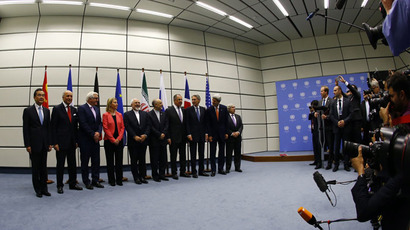Senate fails to sink Iran nuclear deal by tying it to Israel

The last-ditch Republican effort to block the Iran nuclear deal has been defeated in the Senate. An amendment to stop the US from lifting sanctions on Iran until the release of US prisoners and recognition of Israel could not muster enough votes to pass.
Senate Majority Leader Mitch McConnell, a Kentucky Republican, proposed an amendment to the deal demanding that Tehran release all US “hostages” and publicly recognize Israel’s right to exist before President Barack Obama could lift any sanctions against Iran. This would have effectively scuttled the nuclear agreement reached by Iran, the US and five other world powers in July. Sixty votes were required to move the proposal forward, but McConnell only got 53.
Seen on C-SPAN2: Senate blocks disapproval of #IranDeal for third time, 56-42 (60 needed). http://t.co/CWg71t4D8ppic.twitter.com/t6NguHvgG5
— CSPAN (@cspan) September 17, 2015This was the Republicans’ second defeat in seven days, as last week’s attempt to bring the disapproval resolution to a vote was blocked by the Democrats as well. September 17 was the deadline for Congress to finalize its review of the nuclear agreement, under the law adopted in March.
The US Constitution says treaties made by the President need to receive a two-thirds approval in the Senate. Under the terms of the Iran Nuclear Agreement Review Act, also known as Corker-Cardin, the Iran nuclear deal would go forward unless the Senate passed a resolution of disapproval with a two-thirds majority.
By early September, President Obama had secured 34 votes necessary to uphold the veto, guaranteeing the disapproval would fail. By last week, the Democrats had enough votes to filibuster the debate on the disapproval resolution altogether.
BREAKING: Democrats filibuster vote on legislation opposing #IranDeal in Senate http://t.co/jiz8ibclf2pic.twitter.com/273oLmvBCf
— RT America (@RT_America) September 10, 2015Republicans in the House of Representatives have adopted a measure claiming that President Obama failed to disclose all the details of the agreement – as he was obligated to do under Corker-Cardin. However, that determination appears to be largely symbolic, as the deal would live or die in the Senate.
The Israeli government has been vocally opposed to the deal, with the American-Israel Public Affairs Committee (AIPAC) spending up to $40 million on a public relations campaign criticizing the agreement, according to the National Public Radio.
McConnell tried to defend the amendment as “the very least” Senate could agree on, since the Democrats were successfully blocking the disapproval resolution. However, three of the Democrats who opposed the Iran deal joined their party in opposing McConnell’s amendment Thursday: Ben Cardin of Maryland, Bob Menendez of New Jersey and Charles Schumer of New York voted against, leaving only Joe Manchin of West Virginia backing the Republican proposal.
Cardin said before the vote that even if Iran recognized Israel, he would “have no trust in their statement,” The Hill reported. Menendez added that he voted no because even if Iran released all the “hostages” and recognizes Israel, he would still be opposed to the nuclear deal.
READ MORE: Key points of historic nuclear deal reached by Iran and 6 world powers
Without the Senate disapproval, the deal is supposed to go in effect on October 19, ninety days after its endorsement by the UN Security Council.
LISTEN MORE:














